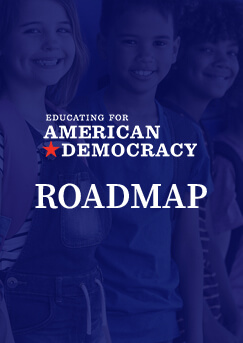
Some of the best ideas our students generate come from the creativity and innovation that is spurred when they are tasked with finding solutions to real problems or complex questions. Their critical-thinking, collaboration, and creativity in this work is often astounding and uplifting. It should be captured and illustrated for the others to see and reflect upon.
That is why we have created the Educating for American Democracy K-12 Student Design Challenge Contest.
Explore the winning student artwork
The design challenges and EAD framework are flexible and offer room for inquiry, a diversity of viewpoints, debate, tension, complexity, nuance, and disagreement. The artwork below is the students’ own interpretation of the design challenges, but they are not representative of the only way to interpret the design challenges. The artwork and thoughts are the student’s own and do not represent the views of EAD, EAD leadership, or EAD affiliates.
The Design Challenge Prompt: As part of the Roadmap to Educating for American Democracy, there are Five Design Challenges that will require students and educators to grapple with complex questions in civics and history—those that most would agree do not have a clear or right answer. While deep classroom conversations on the Five Design Challenges included in the Roadmap will require scaffolding and the support of carefully chosen content and instruction, we think students will have ideas or personal experiences that speak to these Design Challenges and want to offer them the ability to create original artwork to share their ideas for a chance to win a cash prize and have their original artwork featured on the Educating for American Democracy website.
In order to make the Design Challenges accessible to K-12 students, we’ve adapted the language to be student-friendly.
- Design Challenge 1: Helping Students Participate
- Design Challenge 2: America’s Shared Story
- Design Challenge 3: Thinking About Compromise
- Design Challenge 4: Honest Patriotism
- Design Challenge 5: Balancing Time & Theme
You can download the Design Challenges Student Guide to share with students and view the Roadmap Design Challenges here. Be sure to review the complete contest rules and eligibility requirements set forth below (the “Participation Terms”) before submitting student artwork.



